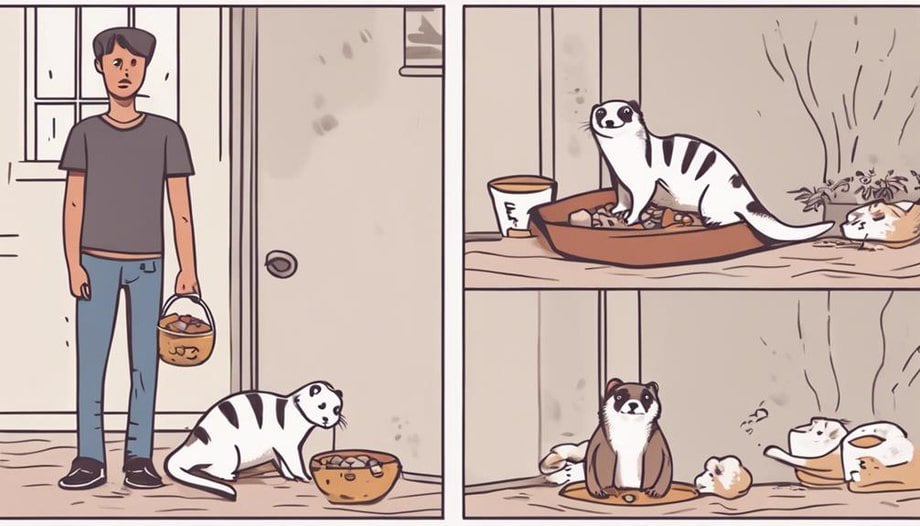What to Do If Your Ferret Refuses to Eat

If your ferret is not eating well, there are a few things you can try to encourage them to eat. First, make sure the food you are offering is fresh and high-quality. Ferrets can be picky eaters, so you may need to experiment with different brands or flavors to find one that they like.
You can also try offering a variety of foods, such as wet food, dry food, and treats, to see what they prefer. Some ferrets may benefit from having their food warmed up slightly before serving, as this can enhance the aroma and make it more appealing.
If your ferret is still not eating well, it is important to consult with a veterinarian to rule out any underlying health issues. In some cases, appetite problems can be a sign of a more serious medical condition that requires treatment.
Remember to always provide fresh water for your ferret and monitor their eating habits closely. By understanding and addressing appetite issues early on, you can help ensure that your ferret stays healthy and happy.
Common Reasons for Ferret Appetite Loss
When a ferret experiences appetite loss, it can be attributed to various common reasons that owners should be aware of. One reason for a ferret's decreased appetite could be related to an inadequate diet. Ferrets require a high-protein, low-fiber diet to thrive, and if their nutritional needs aren't being met, they may lose interest in food. It's essential for ferret owners to provide a balanced diet that includes high-quality ferret food and occasional treats to keep their pets healthy and satisfied.
Another common reason for appetite loss in ferrets is illness or pain. If a ferret is feeling unwell or is in discomfort, they may refuse to eat. In such cases, it's crucial to seek veterinary care promptly to address the underlying health issue. Nutritional supplements and medication options may be recommended by a veterinarian to help stimulate the ferret's appetite and aid in their recovery.
Owners should monitor their ferret's behavior closely and seek professional advice if appetite loss persists, as it could indicate a more serious underlying problem that requires immediate attention.
Monitoring Your Ferret's Behavior

When monitoring your ferret's behavior, pay close attention to their eating patterns, noting any changes or abnormalities.
Behavior changes, such as lethargy or increased aggression, can also indicate underlying health issues affecting their appetite.
Keeping a record of their appetite and behavior can help track any trends or concerns that may require veterinary attention.
Eating Patterns Observation
To monitor your ferret's eating patterns effectively, observe its behavior consistently and document any changes in appetite or feeding habits.
Here are three essential aspects to consider while observing your ferret's eating patterns:
- Feeding Schedule: Keep track of the times you offer food to your ferret and note any deviations from its usual feeding routine.
- Food Preferences: Pay attention to the types of food your ferret usually enjoys and any sudden aversions it may exhibit towards certain foods.
- Mealtime Behavior: Observe how your ferret behaves during mealtime, such as showing enthusiasm or disinterest towards food, to understand its eating habits better.
Behavior Changes Noticed
Observing behavior changes in your ferret can provide valuable insights into its health and well-being, particularly in relation to its eating habits. Keep an eye out for behavioral cues such as increased lethargy, irritability, or changes in social interaction. These changes could indicate underlying medical concerns affecting your ferret's appetite.
Additionally, watch for physical changes like a dull coat, unkempt appearance, or weight loss, as these could also be signs of health issues impacting your ferret's eating patterns. Monitoring your ferret's behavior closely alongside its eating habits is essential in identifying any potential issues early on.
If you notice concerning behavior changes, it's advisable to seek veterinary assistance promptly to address any possible health issues affecting your ferret's appetite.
Appetite Tracking Techniques
Monitoring your ferret's eating habits and behavior can provide valuable insights into its overall health and well-being. Here are some techniques to help you track your ferret's appetite effectively:
- Weight Management: Regularly weigh your ferret to ensure it's maintaining a healthy weight. Sudden weight loss or gain can indicate underlying health issues.
- Food Preferences: Keep a record of your ferret's favorite foods and observe any changes in its preferences. This can help you tailor its diet to ensure proper nutrition.
- Food Allergies, Meal Schedule: Be mindful of any signs of food allergies and stick to a consistent meal schedule. Sudden changes in appetite or behavior around feeding times should be noted and discussed with a veterinarian promptly.
Adjusting Your Ferret's Diet

If your ferret is refusing to eat, consider gradually introducing new food options to adjust their diet. Ferrets can be picky eaters, so transitioning their diet slowly can help prevent digestive upsets. Here are some strategies to adjust your ferret's diet effectively:
| Food Type | Description | Benefits |
|---|---|---|
| Raw Diet | Consists of raw meat and organs | Mimics their natural diet |
| High-Quality Kibble | Premium ferret-specific dry food | Balanced nutrition |
| Wet Food | Canned meat products | Provides hydration |
| Eggs | Cooked eggs, a good protein source | Variety in protein intake |
| Baby Food | Unseasoned meat-based baby food | Easily digestible for picky eaters |
In addition to these food options, consider incorporating dietary supplements and alternative foods to provide a well-rounded diet. Ensure consistency in mealtime routines and consider using treat dispensing toys to make mealtimes more engaging for your ferret. Adjusting your ferret's diet with patience and persistence can help in encouraging them to eat and maintain a healthy appetite.
Encouraging Appetite With Treats

Encourage your ferret's appetite by offering a variety of tasty treats to stimulate their interest in eating. Treat training and positive reinforcement can be effective methods to entice your ferret to eat when they're being picky. Here are three ways to encourage appetite with treats:
- Use High-Value Treats: Opt for treats that your ferret absolutely loves. High-value treats can pique their interest and motivate them to eat their regular food as well. Consider using freeze-dried meat treats or small pieces of cooked egg as these are often favorites among ferrets.
- Rotate Treat Options: Provide a variety of food options to keep mealtime exciting for your ferret. Rotating different treats can prevent boredom and encourage them to explore new flavors. Just ensure that the treats are safe and suitable for ferrets.
- Reward Eating Behavior: When your ferret shows interest in a treat or starts eating, offer praise and affection. Positive reinforcement can reinforce the behavior of eating, making mealtime a more enjoyable experience for your furry friend.
Seeking Veterinary Advice

When noticing persistent refusal to eat in your ferret, promptly consult a veterinarian to address potential underlying health issues. A vet can perform a thorough examination to diagnose any medical conditions causing the appetite loss. They may recommend dietary adjustments, medical intervention, or nutritional supplements to support your ferret's health. Seeking veterinary consultation is crucial as they can provide tailored advice based on your ferret's individual needs.
| Veterinary Consultation | Dietary Adjustments |
|---|---|
| Thorough examination to diagnose issues | Modify food type or texture |
| Tailored advice based on ferret's needs | Adjust feeding schedule |
| Recommendations for medical intervention | Introduce new food items |
| Monitoring progress and follow-up care | Ensure proper hydration |
Engaging with a vet ensures that your ferret receives the best care and treatment plan possible. Remember, early intervention can prevent further complications and help your ferret regain their appetite and overall well-being.
Addressing Dental Issues

Upon consulting a veterinarian for your ferret's refusal to eat, addressing dental issues is crucial to ensure their overall health and well-being. Ferrets, like humans, can suffer from dental problems that may affect their eating habits. Here are three essential steps to address dental issues in ferrets:
- Tooth brushing: Regular tooth brushing can help prevent dental issues in ferrets. Using a small, soft toothbrush and pet-safe toothpaste, gently brush your ferret's teeth a few times a week. This practice helps remove plaque and food debris that can lead to dental problems.
- Dental check-ups: Schedule regular dental check-ups with a veterinarian experienced in exotic pets. These check-ups can help catch any dental issues early on, preventing further complications and ensuring your ferret's teeth and gums are healthy.
- Proper diet: Providing your ferret with a balanced diet that supports dental health is essential. Include crunchy foods like raw meat and bones to help naturally clean their teeth and gums.
Creating a Stress-Free Environment

To ensure your ferret feels at ease during meal times, it's crucial to provide a quiet and calm environment. By minimizing loud noises and disturbances, you can help reduce stress levels and encourage your ferret to eat.
Additionally, allowing your ferret to exhibit natural behaviors like burrowing and exploring can help create a comforting atmosphere for mealtime.
Quiet, Calm Surroundings
Creating a quiet and calm environment is essential when trying to help a ferret who's refusing to eat. To achieve this, consider the following:
- Play Soothing Music and Use Dim Lighting: Gentle background music and soft lighting can help create a relaxing atmosphere for your ferret, reducing stress and anxiety.
- Practice Gentle Handling and Maintain a Comforting Presence: When interacting with your ferret, ensure that your touch is gentle and your demeanor is reassuring. Ferrets are sensitive animals that respond well to calm and caring interactions.
- Minimize Loud noises and Sudden Movements: Avoid sudden noises or quick movements around your ferret's living space to maintain a peaceful environment that promotes relaxation and encourages eating.
Creating a serene setting can significantly improve your ferret's eating habits and overall well-being.
Encourage Natural Behaviors
Maintaining a stress-free environment is crucial to encouraging your ferret's natural behaviors, ensuring a sense of security and well-being. To achieve this, provide natural enrichment by offering toys that mimic hunting behaviors, such as interactive puzzles or toys that dispense treats.
Additionally, create opportunities for behavioral stimulation by setting up tunnels, hiding spots, and climbing structures to promote exploration and exercise. Rotating toys regularly can prevent boredom and encourage mental engagement.
Ensuring your ferret has a designated space for rest and play will help establish a routine, reducing stress and promoting a sense of security. By incorporating these elements into your ferret's environment, you can support their natural instincts and overall well-being.
Frequently Asked Questions
Can Ferrets Be Picky Eaters Like Some Other Pets?
Ferrets can indeed be picky eaters, similar to some other pets. Their feeding habits and training play a crucial role in shaping their food preferences and behavior. It's important to provide a balanced diet to meet their nutritional needs.
Are There Any Specific Foods That Are Known to Be Favorites Among Ferrets?
Ferrets have specific treat preferences that align with their nutritional needs. Common favorites include meat-based treats like chicken, turkey, and lamb. These options are not only tasty but also provide the essential proteins ferrets require for a balanced diet.
How Can I Tell if My Ferret Is Experiencing Nausea or Digestive Issues?
When a ferret feels queasy or has tummy troubles, they may exhibit symptoms like lethargy or drooling. Common medical causes include gastritis or foreign body ingestion. Treatment options involve vet care and preventive measures like a balanced diet.
Are There Any Common Household Items That Could Be Toxic to Ferrets and Affect Their Appetite?
Common household dangers for ferrets that may affect their appetite include chocolate, caffeine, onions, garlic, and grapes. These toxic items can lead to serious health issues and should be kept out of reach of ferrets.
What Are Some Ways to Help My Ferret Maintain a Healthy Weight if They Are Not Eating Enough?
When it comes to helping a ferret maintain a healthy weight without eating enough, feeding strategies play a crucial role. By offering nutrient-dense foods, controlling portion sizes, and incorporating playful exercises, weight management becomes achievable.











